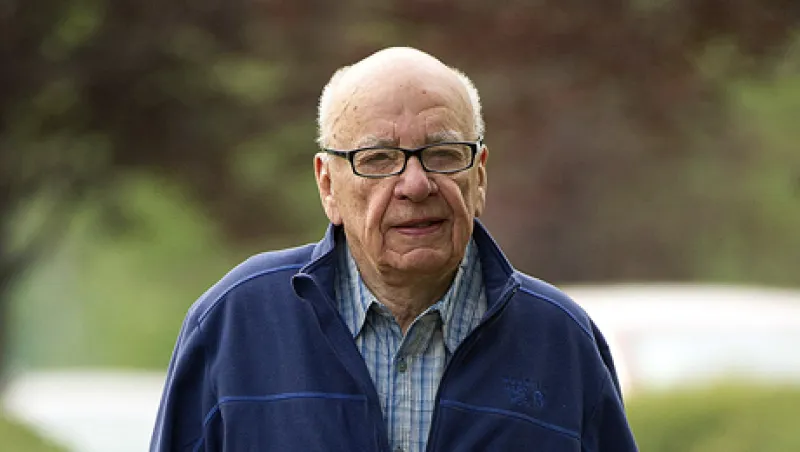Last year the annual shareholders’ meeting of Rupert Murdoch’s News Corporation was a media event, with protestors swarming outside the Twentieth Century Fox Studios in Los Angeles and a mob of angry investors on the inside. As the company prepares for its 2012 meeting, a contingent of pension fund shareholders and others with an ethical investing mandate are honing plans for revolt, demanding new leadership in the House of Murdoch. News Corp. announced this week that the annual meeting will take place on October 16 at Fox Studios on Los Angeles.
The shareholder complaints stem from the 2011 allegations that Murdoch-owned tabloid newspapers in the U.K. had hacked into cell phones of public figures and private citizens. The shareholders are pushing for changes to a corporate culture that they believe allowed unethical news-gathering practices to happen; they are trying to loosen the Murdoch family’s control over the company and improve oversight of News Corp.’s management.
Most of these investors are continuing to take an activist stance rather than sell off their News Corp. stock in protest as the Church of England did in August. The church commissioners and the pensions board of the Church of England had held a total of about $2.97 million in News Corp. shares since 2005, but disinvested on the recommendation of the Ethical Investment Advisory Group, an independent group that advises the church’s investing bodies. The EIAG held talks with News Corp. for a year following the phone-hacking allegations, but said the company did not show a sufficient commitment to reforming its corporate governance. Andrew Brown, secretary of the church commissioners, says one of EIAG’s concerns was that Rupert Murdoch is both chairman and CEO of the company, a practice that is not uncommon in the media industry but is less accepted in the U.K. than in the U.S. — and is viewed by other News Corp. investors as one of the main reasons the company didn’t do a better job of policing its tabloid editors.
“Different shareholders use different strategies to try to force change,” says Julie Tanner, assistant director of socially responsible investing at Christian Brothers Investment Services in New York, which manages approximately $4 billion in assets for more than 1,000 Catholic churches, schools, hospitals and other institutions around the world. Tanner says that although the Church of England made an effective statement by pulling out, her faith-based investment group is determined to continue trying the confrontational route. “We don’t divest as a rule because we do believe, and have demonstrated through our 30-year history, we can change policies and practices,” says Tanner.
That kind of change, Tanner admits, takes patience. The CBIS spent several years pressuring Tyco to create a management position responsible for monitoring the environmental effects caused by disposal of the company’s medical equipment, but it didn’t happen until Dennis Kozlowski stepped down as CEO in 2002 amid investigations of using company funds to maintain his lavish lifestyle.
CBIS and the Local Authority Pension Fund Forum, an advocacy organization for British pension funds with combined assets of over $180 billion, have filed a shareholder resolution to be voted on at this year’s meeting, calling for an independent chairman. Another 18 investors with 13.4 million in nonvoting stock — another bone of contention for News Corp. investors — have sent a letter to the News Corporation board expressing their support for the resolution. Among those who signed the letter are Aviva Investors in the U.K., Calvert Investment in the U.S. and the Connecticut State Pension Fund. The resolution says investors are concerned “about the cost — in jobs, reputation, market position and enterprise value — of inadequate oversight and maintenance of corporate culture within the company and its subsidiaries. . . . That these revelations took years to uncover and are only now being addressed suggest a lax ethical culture and a lack of effective board oversight.”
CBIS has also called upon the board to make five additional reforms. They are asking for a code of ethics that includes stronger editorial standards and monitoring; disclosure on the company’s website about the board’s internal investigations; appointments of truly independent directors, and a reduction of excessive executive compensation. They also want to eliminate the dual-class stock structure; News Corp. stock comes in Class A shares of nonvoting stock and Class B shares of voting stock. CBIS holds 500 voting shares and 500,000 nonvoting shares.
The Nathan Cummings Foundation, a charitable organization established by the founder of the Sara Lee Corporation, has filed a “one share, one vote” resolution of its own, calling for an end to the dual-class system. “Holders of nearly 2 billion of the more than 2.6 billion News Corporation shares are prevented from voting at the company’s annual stockholders’ meeting,” the Cummings resolution says. It also notes “even though Rupert Murdoch owns only 12.5 percent of outstanding shares, the dual-class structure protects his iron grip on the company by giving him nearly 40 percent of the corporation’s voting power.”
News Corp's proxy statement for the 2012 shareholders meeting recommends that shareholders vote against the proposals calling for an independent director as chairman of the board, that the board adopt a simple majority vote policy, and that the company eliminate its dual class capital structure. Last year just over 30 percent of all News Corp. shareholders voted against last year's re-election of directors Andrew Knight, Lachlan Murdoch, James Murdoch, Natalie Bancroft and Arthur Siskind, all of whom were seen as lacking independence from Rupert Murdoch's tight rein. Absent from the ballot this year are Knight, who will retire, and Siskind, who will be director emeritus.
News Corporation has set up a global compliance and ethics team. An August 15 memo from Rupert Murdoch announcing the formation of the internal monitoring group said, in part, “As you are all aware, our company has been under intense scrutiny in the United Kingdom. I assured Parliament and the Leveson Inquiry that we would move quickly and aggressively to redress wrong-doing, cooperate with law enforcement officials and strengthen our compliance and ethics program companywide.”
Tanner is not satisfied that News Corp. has shown investors they are taking their concerns seriously, however. “A year has gone by and we haven’t seen much response to our requests,” she says. “They have stated publicly that they’re conducting an internal board investigation, but there has been no release of information to shareholders about the elements of the investigation or who’s heading up the different parts of the investigation, so it’s hard to have confidence.”
Nor, she says, has News Corp. addressed the investor demands for an independent chairman of the board. The company announced in June that it would spin off its publishing division from the entertainment division, but Murdoch will continue to serve as chairman of both companies, and as CEO of the entertainment division. News Corp. has not named a CEO of the publishing division, though the announcement said that Chase Carey, currently chief operating officer, will be president and COO. The company declined to comment further.
Tanner is measuring News Corp.’s response against that of Time Warner in 2007, when CBIS took similar action with a shareholder resolution calling for separate people to fill the roles of chairman and CEO. At the time Richard Parsons held both roles. Parsons relinquished the CEO spot to Jeffrey Bewkes in 2008 but the separation of positions was short-lived; Bewkes took on the additional role of chairman the next year. “But we worked with Time Warner on this,” says Tanner. She is satisfied that Time Warner’s website now states that when the board leadership changes the company will evaluate whether to keep the two positions separate or combined, as well as examine results of shareholder resolutions, white papers on the subject, and global trends in the industry. “Time Warner at least has spelled out how the board will consider changes,” says Tanner. “We’ve tried to encourage News Corp. to do the same, but their corporate governance guidelines pretty much say it’s all up to the decision of the board.”
This article has been updated to reflect News Corp.’s announcement of details of this year’s annual meeting.






